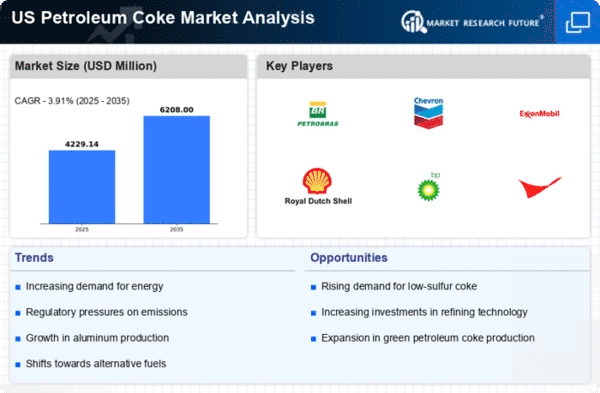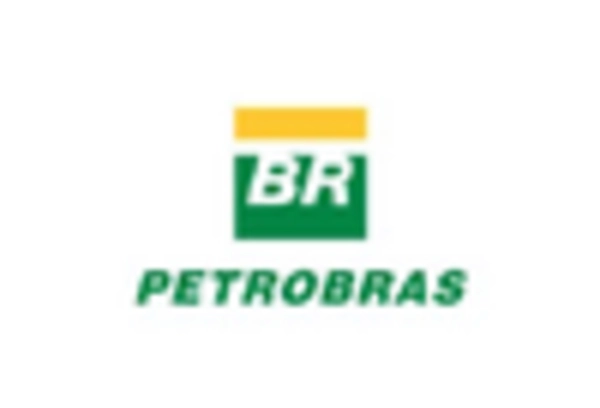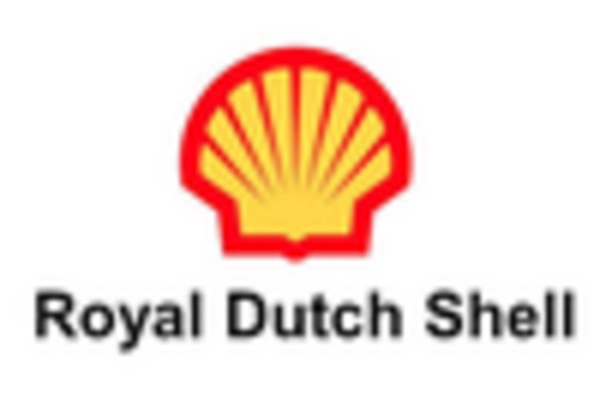The petroleum coke market exhibits a competitive landscape characterized by a blend of established players and emerging strategies aimed at enhancing operational efficiency and market share. Key growth drivers include the increasing demand for petroleum coke in various industrial applications, particularly in the aluminum and cement sectors. Major companies such as Chevron (US), ExxonMobil (US), and Marathon Petroleum (US) are strategically positioned to leverage their extensive supply chains and technological advancements. Chevron (US) focuses on innovation and sustainability, aiming to reduce its carbon footprint while enhancing production efficiency. ExxonMobil (US) emphasizes digital transformation and operational excellence, which allows for improved decision-making and resource allocation. Meanwhile, Marathon Petroleum (US) is actively pursuing regional expansion and partnerships to strengthen its market presence, collectively shaping a competitive environment that is both dynamic and responsive to market demands.In terms of business tactics, companies are increasingly localizing manufacturing and optimizing supply chains to enhance responsiveness to market fluctuations. The market structure appears moderately fragmented, with a few dominant players exerting considerable influence. This fragmentation allows for competitive pricing strategies, yet the collective strength of key players like Valero Energy (US) and ConocoPhillips (US) ensures that competition remains robust, driving innovation and efficiency across the sector.
In October Chevron (US) announced a strategic partnership with a leading technology firm to develop advanced carbon capture technologies aimed at reducing emissions from petroleum coke production. This initiative underscores Chevron's commitment to sustainability and positions the company as a leader in environmentally responsible practices within the industry. The strategic importance of this partnership lies in its potential to enhance Chevron's operational efficiency while addressing growing regulatory pressures regarding carbon emissions.
In September ExxonMobil (US) unveiled a new digital platform designed to optimize its petroleum coke production processes. This platform integrates AI and machine learning to enhance predictive maintenance and operational efficiency. The strategic significance of this development is profound, as it not only streamlines operations but also aligns with the broader industry trend towards digitalization, potentially leading to cost reductions and improved product quality.
In August Marathon Petroleum (US) completed the acquisition of a regional petroleum coke producer, thereby expanding its market footprint and enhancing its supply chain capabilities. This acquisition is strategically important as it allows Marathon to diversify its product offerings and strengthen its position in key markets, particularly in the Midwest, where demand for petroleum coke is on the rise.
As of November current competitive trends in the petroleum coke market are increasingly defined by digitalization, sustainability initiatives, and the integration of AI technologies. Strategic alliances are becoming pivotal in shaping the landscape, enabling companies to pool resources and expertise to tackle common challenges. Looking ahead, competitive differentiation is likely to evolve from traditional price-based competition towards a focus on innovation, technological advancements, and supply chain reliability. This shift suggests that companies that prioritize these areas will be better positioned to thrive in an increasingly complex and competitive market.
















